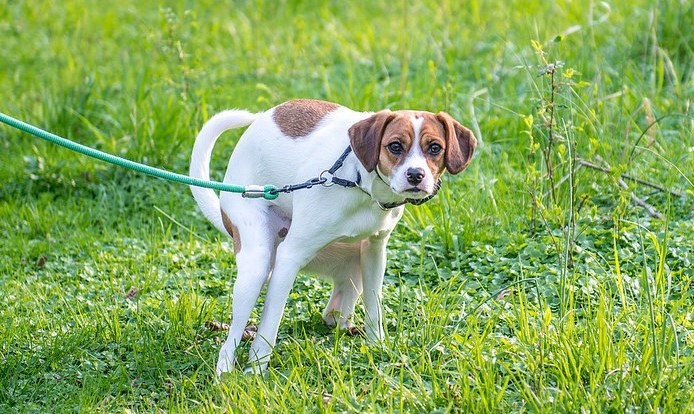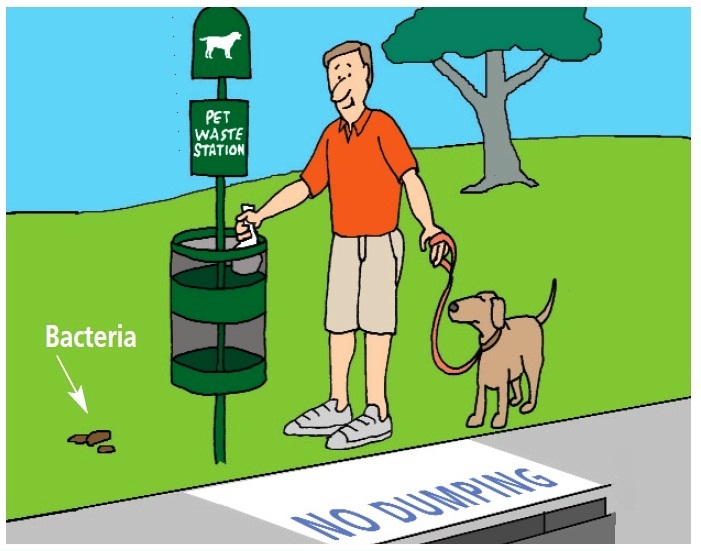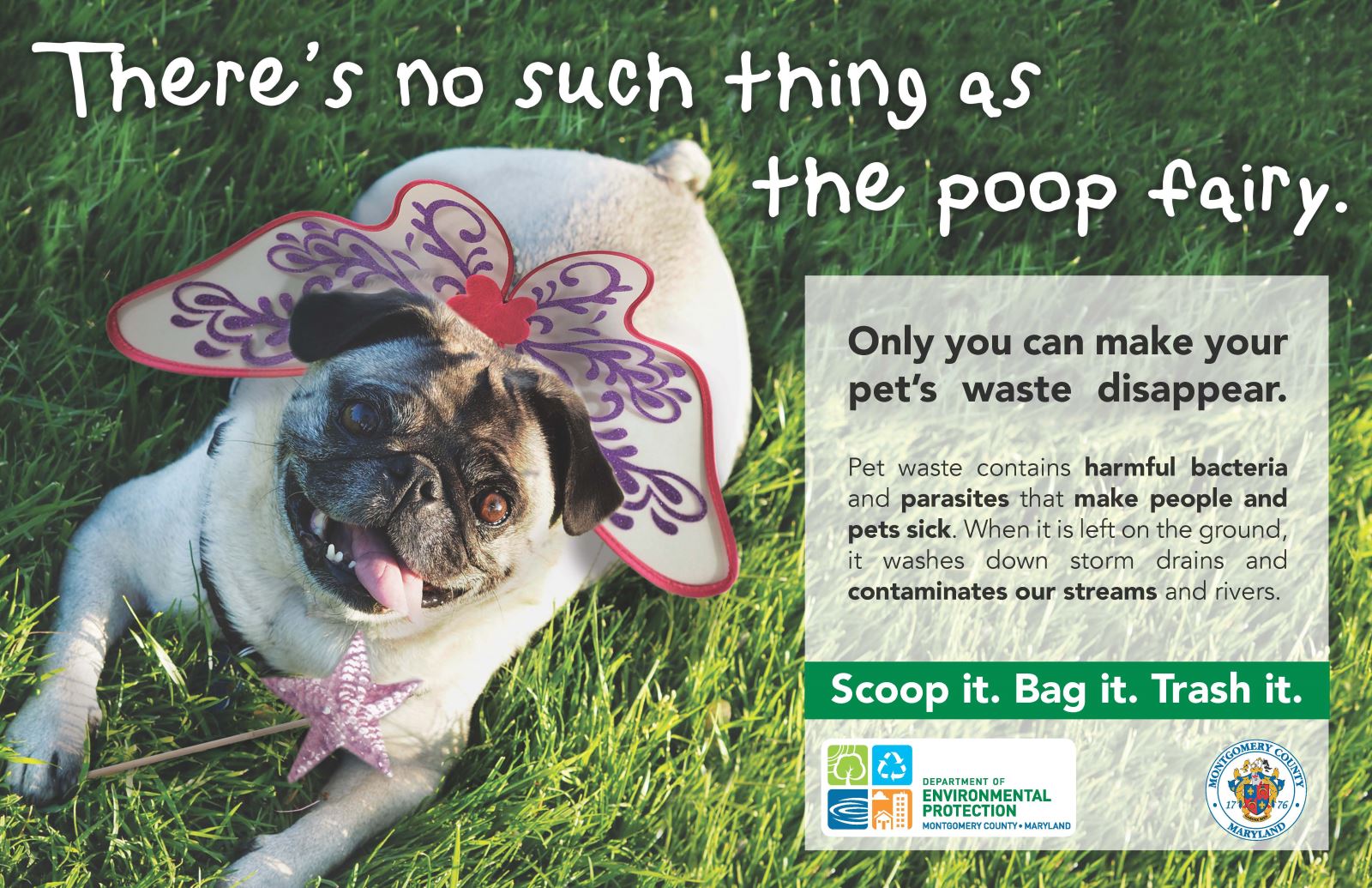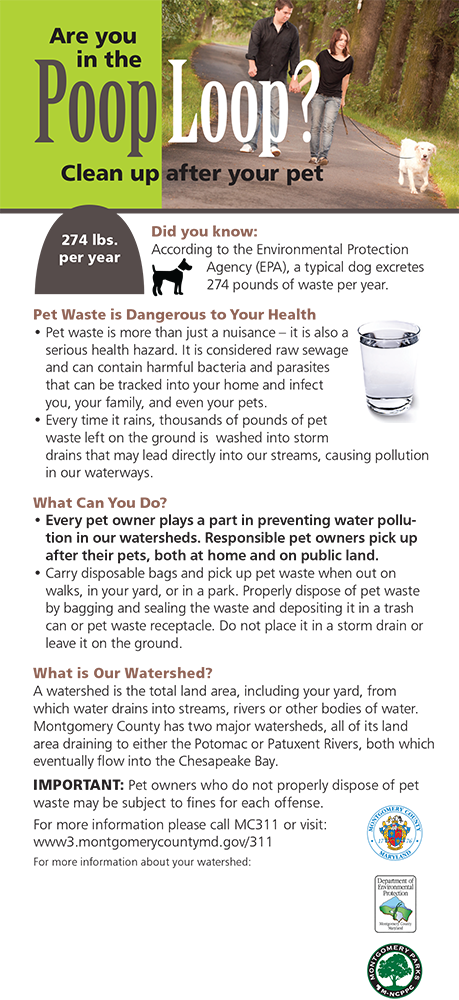Pet Waste

No one likes to find dog poop on the ground. It smells, makes parks and sidewalks look bad, and if you're not careful, can be tracked into your home on your shoes. Take one wrong step and dog poop from the street can make its way into our homes, potentially bringing harmful parasites and bacteria with it.
How is Pet Waste Harmful?
According to the U.S. Environmental Protection Agency, dogs can serve as the hosts for up to 65 diseases that can be transmitted to humans, including hookworms, roundworms and threadworms. If left on the ground, these parasites, bacteria, and viruses can contaminate the water, soil, and infect both pets and humans.
Every time it rains, dog waste left on the ground makes its way to our waterways causing elevated levels of bacteria in our rivers and streams! Studies have found that 20% of the bacteria contaminating some waterways can be traced back to the digestive system of dogs.
Rock Creek, Cabin John, and Anacostia watersheds in Montgomery County currently have elevated levels of bacteria.
Help Protect Our Local Waters! Scoop It, Bag It, Trash It!
Every pet owner plays a part in preventing water pollution in our rivers and streams. Responsible pet owners pick up after their pets, both at home and on public land.
In Your Yard
Many people train their dogs to take care of business in their backyards. Make sure your backyard is cleaned regularly so that the dogs are not stepping on their own waste while in the yard and then bringing bacteria inside your home.
Picking up waste from your backyards regularly will not only ensure your pets are healthy, but it will reduce the amount of bacteria and nutrients reaching our local waters.
Bagged dog waste can be placed in the household trash for pick up during your regular trash day. Remember to make sure it is bagged appropriately to prevent odors or any other issues.
Myth: Dog Waste Acts as a Fertilizer
Reality: There is No Benefit to Soil from Dog Waste
Dogs digest food very differently than animals whose manure is typically used as fertilizer, such as cows. Cows digest their plant-based diet four times more than dogs. While it does contain trace amounts of nutrients, leaving it on the ground simply does not outweigh the cons of all the concentrated bacteria it contains and the negative impact on our waterways and streams.
While on Walks
 Carry disposable bags and pick up after your pet when out on walks. If you hire a dog walker to walk your dog, please make sure they too pick up after your pet when out on their daily walk.
Carry disposable bags and pick up after your pet when out on walks. If you hire a dog walker to walk your dog, please make sure they too pick up after your pet when out on their daily walk.
- Properly dispose of pet waste by bagging the waste and depositing it a trash can or pet waste receptacle.
- If walking your dog in the woods, please also be responsible and pick up after your pet. If you do pick up after your dog while walking in the woods, please do not toss bagged poop into the woods.
- Please do not throw bagged pet waste in storm drains, leave it on the ground, or toss it in the woods.
- Tip: Reuse bags, that would have ended in the trash, to pick up after your pet. Ask your coworkers/neighbors/friends to collect bread, newspaper, bagel, or produce plastic bags. Not only will you be reusing bags, but you are saving money by not having to buy pet waste bags or paying the 5 cent fee for bags at grocery stores.
Montgomery County's Pet Waste Management Program
The Department of Environmental Protection needs your help to reduce bacteria levels in our local rivers and streams. We are collaborating with homeowner associations, educating the community, and installing pet waste stations in common areas managed by the HOAs.
In the end, it is a win-win situation. Bacteria issues caused by pet waste are addressed and the community benefits from not having pet waste left on the ground. Imagine poop free play areas for all!
Since December 2014, 100 pet waste stations have been installed and about 68,000 pounds of waste has been collected through this program. Imagine that – more than 34 tons of poop!
Homeowner Associations Eligibility criteria:
- Located in Montgomery County. One exception: HOAs located in a municipality such as City of Rockville, City of Gaithersburg and City of Takoma Park.
- Currently do not have a pet waste management program
- Interested in having a pet waste management program
Eligible HOAs will receive:
- Onsite evaluation
- Outreach materials
- Depending on the extent of the issue, a certain number (to be decided with the HOA) of pet waste stations. The stations will be maintained up to a year. All for free!
- At the end of the year, the HOA can decide to adopt the stations by taking over the maintenance.
HOA/Condominium Associations interested in installing pet waste stations can send an email to [email protected] or call or customer service at 311 (240-777-0311) for questions or concerns.


